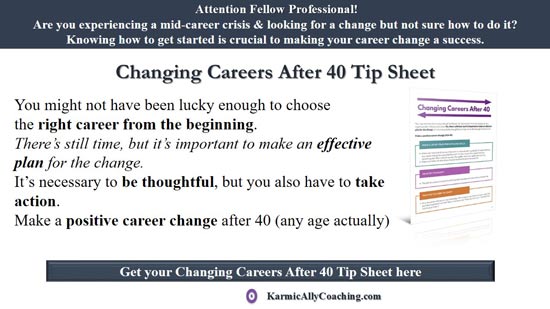This post has already been read 2084 times!

Sticking to a dead end job for the money or feeling dis-empowered because of financial commitments is more common than you would imagine.
I covered how to overcome that fear and do the right thing by you in my post What’s more important – Money or Your toxic Job?
But what about a situation where it isn’t the money?
When your heart has stopped singing, you’re dragging yourself to work each morning or you feel you’ve gone as far as you can in your career and want more?
Or you’re in a job that is being made redundant. This has triggered a thought that has been lurking in your mind. That you want to do something different but ambivalent about stepping out of your comfort zone.
It could also be that you’ve moved up the Maslow Hierarchy of Needs and you’ve figured out your current career is not aligned with your new need. I’ve personally experienced this as I narrate in my Meet the Coach page.
It’s also the impression I get from the questions I’m often asked on Quora about mistakes in jobs or changing careers.
In the case of the former, the solution is easy. Find a new job but changing a career is a different kettle of fish and you need to be clear on what you want.
It’s apparent the answer seeker has already figured out they want to change their career but aren’t sure how to go about it.
Here’s what I feel.
Choosing a new career is never an easy choice.
Yet, following your passion is worth every effort that you put into planning a change in your career.

With adequate planning, the switch over can be exciting, motivating, and rejuvenating instead of fraught with worry.
If that’s your situation, consider the following factors for starters as you plan and implement your career change:
Assess your motives for the career change
The importance of this factor must not be underestimated. Changing a career, especially at a later stage of your career journey can be risky and might not be all that you think it is.
Hence, you need to unearth the reasons for your desire to change careers. Do you feel underappreciated, underpaid, overworked, or unsatisfied in your current position?
If so, dig deeper to discern whether your current employer or the career field as a whole is at the route of your dissatisfaction.
- If you discover that the source of your unhappiness is your employer, change employers rather than starting an entirely new career. It’s much easier to get a job within your current career field than to get your foot in the door of a completely separate career field.
- If your issue is being underpaid or overworked, it may not be necessary to change employers. Gather your information to support your view or make a business case for your request and have a talk with your supervisor. Tell them how your current position is making you feel. If you’re an asset to the company, you may be able to work out an agreement for a raise, promotion or fewer working hours.
Still not sure? Karmic Ally Coaching’s Changing Careers After 40 Tip Sheet will provide insights.
Continue your education and research
Continuing professional education and staying on top of developments in your field is a must.
But what about the new career?
If you’re considering a drastic career change, such as going from being an Internal Auditor to a career in Holistic Nursing, clearly you’ll need additional training. More common career changes may require less continued education, if any at all.
- Consult with an admissions advisor of a local college or of one specializing in your new career field in order to discern whether any continued education or additional training is necessary. If so, discuss scheduling, whether it can be done online, tuition assistance, and so on.
- Search for job postings online which fit the career field you’d like to enter. Generally, the employer or recruiter will list the required education and experience necessary to be considered for the job.
- Connect with professionals in the new career field on LinkedIn and Facebook and request them for information. As long as you don’t pick their brains too much and are focused on the questions you have, you will get the information you want.
- In some instances, a certificate may not be enough to get your foot into the door of a new career field. You might also be required to do an internship or apprenticeship for a period that can range anywhere from 1 to 3 years which might not pay well. If your passionate about the new career field, you must work out the finances to support you during the apprenticeship if it is more than a one-year time investment.
- Consider the possibility that additional training may be all that’s necessary to improve your current career. Perhaps additional education will place you in line for a promotion or more challenging work. For example, if you’re working in a bank and aspire to a bank officer position, sitting the Bankers Institute Examination and passing them would position you for consideration for your desired job and step up the career ladder if you already have a good performance track record.
Take it slowly
This tip is based on my observation of amazing professionals who hire me for consultations after they have resigned rather than while they still had their jobs and could leverage their employment to appear desirable to a prospective employer.
The sad truth is it’s easier to get a new job when you have a job!
Hang on to your current paycheck for as long as you can, preferably until you can secure a position with a new employer. Set up interviews while you’re still employed and only quit your current position once you’ve found a job.
- When you’re currently employed with another company, you have more bargaining power in terms of salary when considering a position with a new employer.
- Once you’ve secured a position, it’s time to give notice to your current employer in accordance with your employment contract. Make sure your conduct is professional throughout this period. Be honest about your reason for leaving. This conduct, especially if it is a longer notice period of say 3 months increases the chances of a good recommendation. It will also prevent them from being surprised when someone calls to confirm a reference.
With the right research and planning that includes ensuring your family’s security, there’s no reason why you cannot explore a new career in a field that will make your heart sing and give you a new purpose.




 I adhere to the Certified Coaches Alliance Code of Ethics and Standards. A copy is available on request.
I adhere to the Certified Coaches Alliance Code of Ethics and Standards. A copy is available on request.
 Let's Talk through the Connect Form:
Let's Talk through the Connect Form:
And, take it slowly. That, in its own, is the hardest part of change for me. It’s taken me a long time to understand that it’s about the journey, not the destination. When it came to employment shifts, the next one was always right there waiting for me.
This is a great article, Vatsala. You always share wonderful pearls of wisdom!
I had a similar journey Cindy, and when the time came to make a career change, I knew every experience I had till then was meant to prepare me for the big move.
Your post is directly in sync with my life & the thoughts I’ve always had regarding starting a new path or life. Your past doesn’t dictate you future, it’s who you choose to be, love that, it’s a beautiful thing to know that
Thank you Heather. It’s important to release ourselves from the limiting belief that our past dictates our future. We can always change things if we are motivated to create change and are willing to work towards our goal.
The day I walked away from a job I hated and opted to retire was one if the best decisions I ever made.
Walking away from a job that doesn’t make your heart sing is better for one’s emotional well-being and health, Barbara. Many people go on to achieve great things post-retirement by following a different path where they get an opportunity to use their experience and wisdom to create change for others.
Great post on career change Vatsala! I agree it’s so much easier getting a new job when you already have one. I’ve always overlapped my job or career change with another and that way I can ease into the new one but still have the financial support of the old one. (:
Thanks Debra. It’s a wise decision to have the overlap especially when one is already a senior professional and the openings at the top positions are fewer than entry or mid-level professionals. Money worries is the last thing one needs when embarking on a new adventure. 🙂
I was always very lucky — the next opportunity just kept showing up!
I had a similar experience when it came to jobs, Andrea. I’d be at the right place at the right time but when it came to changing my career path from a finance specialist to an Executive Coach, I had to plan it properly.